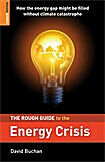EU energy – the big picture
Posted in Books, Policy on 10/18/2010 06:03 pm by The European Union cannot be accused of failing to see the big picture on climate change. The only problem, and it is major, is that Europe lacks followers of its lead.
The European Union cannot be accused of failing to see the big picture on climate change. The only problem, and it is major, is that Europe lacks followers of its lead.
However, for years, EU policy on energy – responsible for around two-thirds of all greenhouse gases – has seemed remarkably narrow. It has focused almost exclusively on networks and, among networks, almost exclusively on electricity and gas.
There were good treaty-based reasons for the narrowness – unlike other federations, the EU has no legal power over its member states’ energy reserves, depletion policies, upstream taxation, infrastructure planning or energy mix. And the fixation with electricity and gas relates to the fact that these depend on cross-border grids and pipelines that, if unregulated, could be abused by suppliers. Nonetheless, future historians may wonder why so much of Europe’s energy policy over the past 20 years was focused on the technical business of network unbundling in the misguided belief that removing any market blockages of distortion and discrimination could trigger clean-energy investment fast enough to keep pace with galloping climate change.
Belatedly, EU energy policy is taking a more interventionist turn. Climate change cannot be left to the single market to resolve when climate change is itself a market failure. Under the Lisbon Treaty, member states still retain formal control over their energy mix, but not one of the 27 disputed the setting, at EU level, of national renewable energy targets. For the first time, Europe’s economic recovery programme put some serious EU money into plugging gaps in cross-border energy networks. Plans to continue this will appear in the European Commission’s energy infrastructure package, due out in November 2010.
However, at the same time, EU interventionism should be limited to setting targets, pooling research resources, passing on good practice and, of course, creating networks. Member states should not be forced into an EU template when it comes to how they reach their emission reduction targets. One of the aims of my new book, The Rough Guide to the Energy Crisis, is to promote public awareness of different energy technologies, because a properly workable energy policy will be composed of a multiplicity of energy sources and efficiencies. There will be nothing exclusive about it. All too often, the low-carbon parts of the energy industry – nuclear and renewable energy – are at odds with each other, each warning governments about the other. Yet, only their combined efforts are likely to get us to a low-carbon economy.
In this regard, the EU is lucky to have member states that have specialised in one or the other – France in nuclear, and Germany, Spain and Denmark path-finders in renewables – all of them with expertise to hand on to others. There can be a useful flexibility in federal systems. In the US, where there is no federal energy policy worthy of the name, California has acted as a pole of attraction, drawing a dozen other US states to adopt its tighter vehicle-emission standards.
Part of the widening scope of EU energy policy is simply to match developments elsewhere, especially US regulation of offshore drilling and of energy trading. BP’s Gulf of Mexico spill has rightly put offshore drilling under the spotlight, but in Europe this is probably something that individual governments around the North Sea can be trusted to manage. Energy trading may need some EU-wide supervision, but the Rough Guide explains the difficulty of standardising trade in oil, which comes in so many different grades.
Let’s not pretend that moving to a low-carbon economy is going to be anything but a slow slog. Fossil fuels are convenient and versatile, and many renewables are not. However, Europe has the technical and financial means to lead the great escape from fossil fuels.
David Buchan is a senior research fellow at the Oxford Institute for Energy Studies and author of Energy and Climate Change: Europe at the Crossroads and The Rough Guide to the Energy Crisis.

